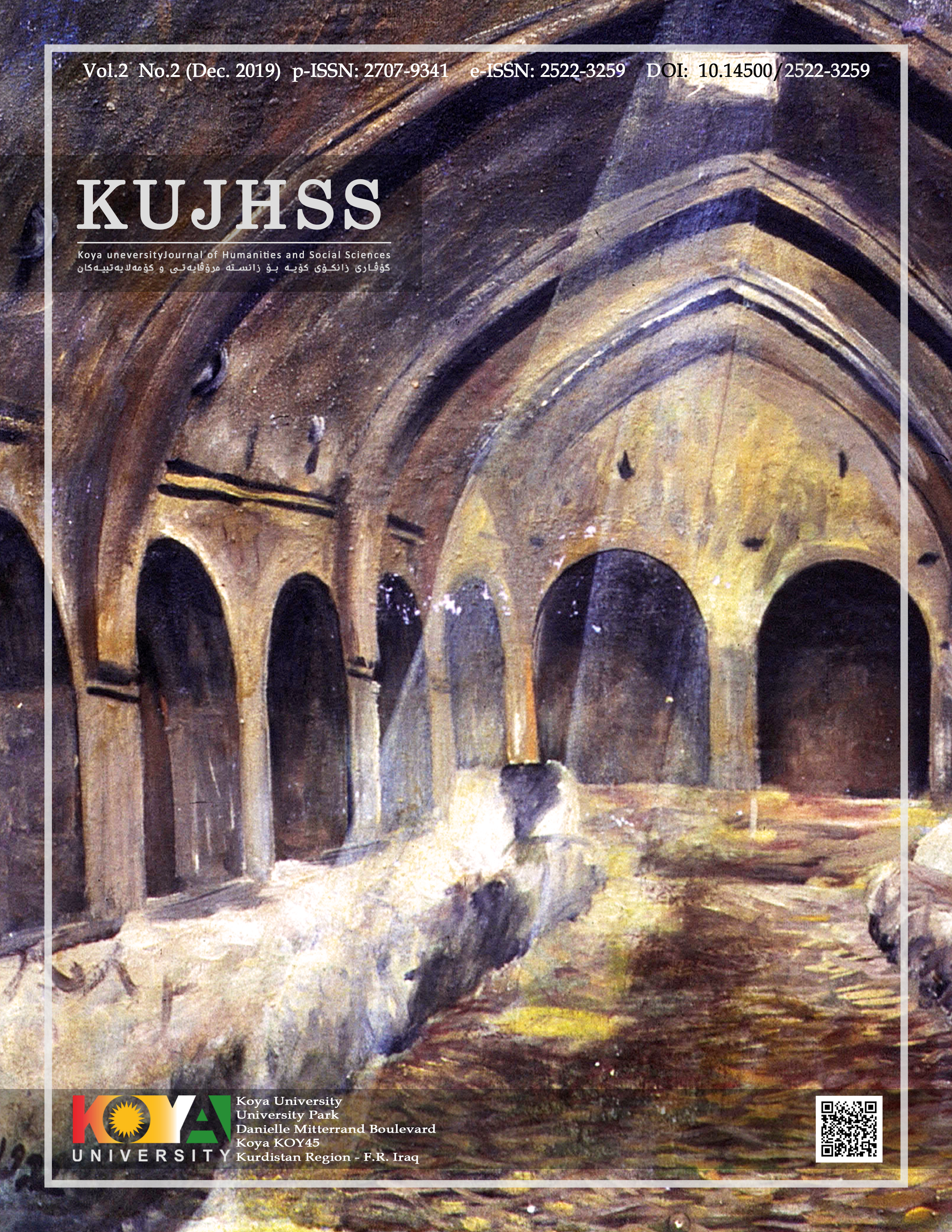The Reality of Poetic Necessity for Grammarians
DOI:
https://doi.org/10.14500/kujhss.v2n2y2019.pp135-138Keywords:
Barrier, Exigencies, Force, Necessity, TruthAbstract
The present study deals with the fundamentals of the poetic necessity that is under the scholars’ view points as they explained in their books with their various opinions and views. In this regard, we presented this paper entitled the fundamentals of the poetic necessity to the grammarians. After a precise definition of this phenomenon, two trends presented and the boundary of the inevitability of poetic necessity in Arabic poetry identified. In the first trend, the scholars’ views who support this phenomenon in order to organize rhyme and rhythm in the Arabic poetry; It does not exist in the other literary aspects. The results showed that this trend is weak. The second trend focused on the opinions of the scholars who proved with the scientific evidences that this phenomenon is a kind of expansion in the language of poetry which its level is beyond the ordinary language. The poets did not need to use this trend. They themselves were the inventors of rhetoric language and what they were allowed to use as puns; it was not allowed to others. In this regard, there is not any relation between poetic necessity and rhyme and rhythm. As a result, there is no objection to this topic to be a part of the literary language and idiomatic expressions and (the Holly Quran). Therefore talking about the necessity of poetry requires us to talk about the temporal and spatial boundaries that have been set up to protest against Arabic poetry, in order to show the reader what we bring to the models it did not come out of the framework of our study. The scholars gathered the necessities that the poets resort to in ten necessities: cutting and joining, easing and tightening, stretching and shortening, housing and moving, preventing drainage and drainage.
Downloads
References
ابن الأنباري، أبو البركات،١٩٨٠، البيان في غريب إعراب القرآن، القاهرة، الهيئة العامة للكتاب، ص: ١/١٠٦.
ابن جني، أبو فتح عثمان، ١٩٦٦م، المحتسب في وجوه شواذ القراءات والإيضاح عنها، القاهرة، المجلس الأعلى للشؤون الإسلامية، ص: ٢/٧٠.
ابن سنان، الخفاجي أبو محمد عبد الله بن محمد بن سعيد، ١٤٠٢هـ - ١٩٨٢م، سر الفصاحة، د.م، دار الكتب العلمية، ص: ٢٧٥ – ٢٧٦.
ابن عصفور، أبو الحسن علي بن مؤمن بن محمد، ١٩٨٠م، ضرائر الشعر، د.م، دار الاندلس للطباعة والنشر، ص: ٢٦٩.
ابن فارس، ١٤٤٠ه – ١٩٩٧م، الصاحبي في فقه اللغة، القاهرة، دار الكتب العلمية، ص: ٢٣١
ابن قتيبة الدينوري أبو محمد عبد الله بن مسلم، ١٤٢٣هـ، الشعر والشعراء، القاهرة، دار الحديث، ص: ١/١٩٠.
ابن مجاهد، أبو بكر أحمد بن موسى بن العباس التميمي البغدادي، ١٩٨٨م، كتاب السبعة في القراءات، القاهرة، دار المعارف، ص: ٣٠٥.
الأخفش الأوسط، أبو الحسن سعيد بن مسعدة، ١٩٩٠م، معاني القرآن، القاهرة، مكتبة الخانجي، ص: ١٥٥، ١٤٩، ٦٢، ٧٩.
البغدادي، عبد القادر بن عمر، ١٤٢٠ه -٢٠٠٠م، خزانة الأدب، القاهرة، مكتبة الخانجي، ص: ١/١٥، ٢/٩٢.
التهانوي، محمد بن علي القاضي، ١٩٩٦م، كشاف اصطلاحات الفنون والعلوم، بيروت، مكتبة لبنان ناشرون، ص: ٢/١١١٥.
الجاحظ، أبو عثمان عمر بن بحر، ١٤١٨هـ - ١٩٨٨م، البيان والتبين، القاهرة، مكتبة الخانجي، ص: ١/٢٢٢.
الحفظي، حسن بن محمد،٢٠١٠م، شرح الأجرومية، القاهرة، عالم الكتب، ص: ١/٩٣.
د.ت، المزهر في علوم االلغة وأنواعها، القاهرة، دار التراث، ص: ١/٢٢
الزجاج، أبو إسحاق إبراهيم بن السري، د.ت، معاني القرآن وإعرابه، بيروت –لبنان، عالم الكتب.
سيد البحراوي، د.ت، كتاب العروض للأخفش، مصر، المعارف، ص: ١٤٨-١٤٩.
السيوطي جلال الدين عبد الرحمن بن أبي بكر، د.ت، الاقتراح في أصول النحو، القاهرة، د.ن، ص: ٥٥.
الصاعدي، عبد الرزاق بن فراج، ١٤٢٢هـ - ٢٠٠٢م، تداخل الأصول اللغوية وأثره في بناء المعجم، السعودية، عمادة البحث العلمي، ص: ٢/٧٠٢.
عبد الحميد، أحمد مختار، ١٤٢٩هـ – ٢٠٠٨م معجم اللغة العربية المعاصرة، د.م، عالم الكتب، ص: ٢/٧٠٢.
عبد اللطيف، محمد حماسة، ١٩٧٩م، الضرورة الشعرية في النحو العربي، القاهرة، مكتبة دار العلوم، ص: ١٥٧،١٥٨،١٥٣.
الفراء، أبو زكريا يحيى بن زياد، د.ت، معاني القرآن، القاهرة، الدار المصرية للتأليف والترجمة، ص: ٣/٢٢١، ١٦١ – ١٦٢.
المبرد، أبو العباس محمد بن يزيد بن عبد الأكبر الثمالى الأزدي، د.ت، المقتضب، بيروت، عالم الكتب، ص: ٤/٢٦٢.
المرزباني، ابو عبد الله بن محمد بن عمران بن موسى، د.ت، الموشح في مآخذ العلماء على الشعراء، مصر، نهضة، ص: ٢٨٤.
النحاس، أبو جعفر أحمد بن محمد بن اسماعيل، ١٩٨٨م، إعراب القرآن، بيروت – لبنان، عالم الكتب، ص: ٣/٤٥٤، ١/٢٢٥، ٢/٥، ١/٢٤٩، ٣/٧٠، ٣/١٨٤، ٣/٢١٠.
الهروي، أبو سهل محمد بن علي بن محمد، ١٤٢٠هـ، أسفار الفصيح، سعودية، عمادة البحث العلمي بالجامعة الإسلامية، ص: ٢٣٩-٢٤٠.
١٩٨٠م، همع الهوامع في جمع الجوامع، الكويت، دار البحوث العلمية، ص: ٣٧.
Downloads
Published
How to Cite
Issue
Section
License
Copyright (c) 2019 Bakhtiar A. Rashid

This work is licensed under a Creative Commons Attribution-NonCommercial-NoDerivatives 4.0 International License.








